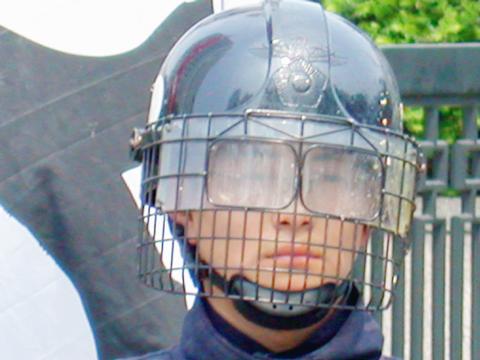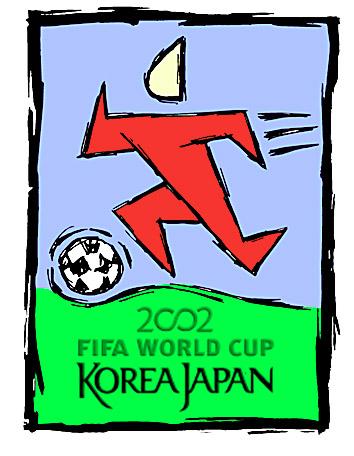It could have been all over before the World Cup even started.
Taking photographs just after my arrival at Incheon Airport in South Korea, I felt a hand on my shoulder and looked around. The security officer was clearly not amused and wagged his finger. "You, come with me," he said.

PHOTO: JULES QUARTLY, TAIPEI TIMES
If I had not known before that this tournament was going to be the most security-minded World Cup ever, I did now.

It had been a smooth two-and-a-half hour flight to Seoul from Taipei and airport security seemed fairly relaxed.
I wondered where the explosive detecting EGIS-2 system was and when my bag would go through it. I looked for heavily-armed security personnel in plastic body armor.
But instead of a heavy military presence there were the usual custom officers and I took a picture of them instead. Which was when I was tapped on the shoulder and asked to follow a man in civilian clothing.
As I put my camera away and began to pack my bags the plainclothes security officer asked me whether I was a journalist and could he see my ID?
That was it. The officer explained that I couldn't take the photo without permission, and then he gave me said permission.
I was pleased to have picked up just a yellow card.
Now I could see there were a lot of guys looking around doing nothing, most of them I now suspected were plainclothes security guards.
A cute-looking labrador-cross-sheepdog walked by waving his tail and started sniffing my bag. I asked if I could take a photo, but perhaps the trainer wanted to retain his dog's cover.
Otherwise, there was none of the security circus that greeted the US team when it arrived in South Korea last week.
Three helicopters, a cordon of 500 national policemen and eight Korean military SWAT team mem-bers stood guard with automatic weapons when they arrived.
When South Korea held the Olympics in 1988 it was worried about the threat of attack from North Korea. In the wake of Sept. 11, it is more concerned with terrorists, particularly in relation to Americans.
The US' first game is on June 5 against Portugal. It then faces South Korea on June 10 and Poland on June 14 in the round-robin portion of the tournament.
At the main press center in downtown Seoul yesterday there were the standard police escorts and magnetometers. But security was more concerned with sorting out skinheads from journalists after an Englishman managed to fool them last week.
Outside the press center the South Korea Socialist Party was massing to protest against the privatization of state industries.
Phalanxes of riot police cordoned off the demonstration and gradually, when press interest faded, Korea's "Red Army " went away.
The president of the South Korea Socialist Party, Wong Yong-shu, told the Taipei Times that it was a peaceful protest to make people aware of the problems resulting from the selling off of the nation's key industries.
"There is a deepening class divide which is causing social problems. We have had to take to the streets to fight this," he said.
When asked whether the socialist party was affiliated in any way with North Korea, he said, "No, no, no. We are not against capitalism and we are not for North Korea. This is about justice."

SECURITY: As China is ‘reshaping’ Hong Kong’s population, Taiwan must raise the eligibility threshold for applications from Hong Kongers, Chiu Chui-cheng said When Hong Kong and Macau citizens apply for residency in Taiwan, it would be under a new category that includes a “national security observation period,” Mainland Affairs Council (MAC) Minister Chiu Chui-cheng (邱垂正) said yesterday. President William Lai (賴清德) on March 13 announced 17 strategies to counter China’s aggression toward Taiwan, including incorporating national security considerations into the review process for residency applications from Hong Kong and Macau citizens. The situation in Hong Kong is constantly changing, Chiu said to media yesterday on the sidelines of the Taipei Technology Run hosted by the Taipei Neihu Technology Park Development Association. With

CARROT AND STICK: While unrelenting in its military threats, China attracted nearly 40,000 Taiwanese to over 400 business events last year Nearly 40,000 Taiwanese last year joined industry events in China, such as conferences and trade fairs, supported by the Chinese government, a study showed yesterday, as Beijing ramps up a charm offensive toward Taipei alongside military pressure. China has long taken a carrot-and-stick approach to Taiwan, threatening it with the prospect of military action while reaching out to those it believes are amenable to Beijing’s point of view. Taiwanese security officials are wary of what they see as Beijing’s influence campaigns to sway public opinion after Taipei and Beijing gradually resumed travel links halted by the COVID-19 pandemic, but the scale of

A US Marine Corps regiment equipped with Naval Strike Missiles (NSM) is set to participate in the upcoming Balikatan 25 exercise in the Luzon Strait, marking the system’s first-ever deployment in the Philippines. US and Philippine officials have separately confirmed that the Navy Marine Expeditionary Ship Interdiction System (NMESIS) — the mobile launch platform for the Naval Strike Missile — would take part in the joint exercise. The missiles are being deployed to “a strategic first island chain chokepoint” in the waters between Taiwan proper and the Philippines, US-based Naval News reported. “The Luzon Strait and Bashi Channel represent a critical access

Pope Francis is be laid to rest on Saturday after lying in state for three days in St Peter’s Basilica, where the faithful are expected to flock to pay their respects to history’s first Latin American pontiff. The cardinals met yesterday in the Vatican’s synod hall to chart the next steps before a conclave begins to choose Francis’ successor, as condolences poured in from around the world. According to current norms, the conclave must begin between May 5 and 10. The cardinals set the funeral for Saturday at 10am in St Peter’s Square, to be celebrated by the dean of the College